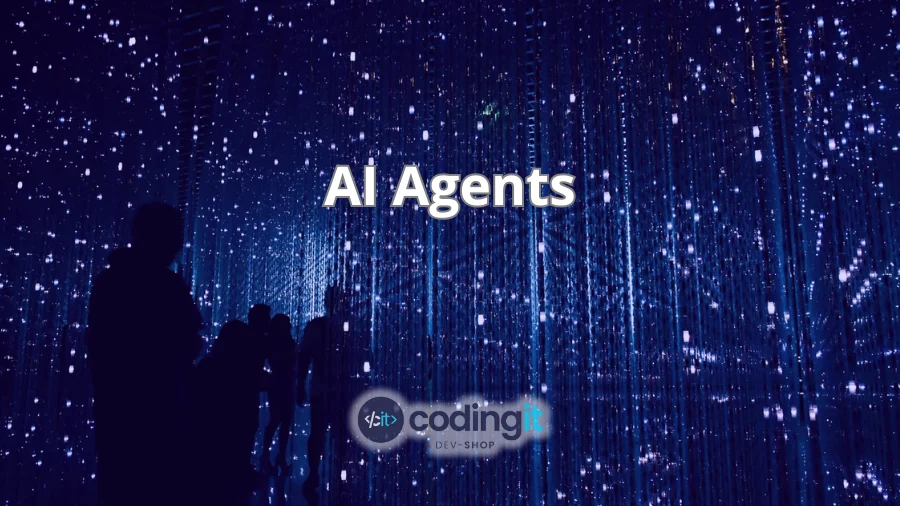The AI revolution is here, and it’s moving faster than most of us expected to be honest. In just a few weeks, we’ll step into 2025, and it looks like it’s going to be a year poised to redefine the way businesses operate. Companies that harness the power of AI agents -intelligent systems that automate tasks, analyze data, and enhance customer experiences- are already gaining a competitive edge. By the time the new year hits full swing, businesses without AI will find themselves playing catch-up, struggling to match the speed, precision, and scalability that AI agents bring.
AI agents are becoming the foundation for smarter operations and better customer engagement for startups and mid-sized companies. Having a digital workforce that works 24/7, responding to customers, predicting trends, and streamlining processes sounds quite good, right? All while freeing your team to focus on strategy and innovation. That’s the kind of transformation AI agents deliver, and it’s why forward-thinking companies are already investing in their development.
But with opportunity comes the challenge. Adopting AI agents takes time. How do you make sure they align with your specific goals? Can you trust them to handle critical processes? And how do you integrate them into your existing systems without spending a huge amount of money or time? These hurdles can become manageable, but some planning needs to go behind them. All things said, the rewards are well worth the effort.
We are not trying to sell you on the concept of AI here. You already know it’s the future. Instead, we’re trying to present you ways to embrace it effectively, avoid common pitfalls, and unlock the full potential of AI agents for your business in 2025 and beyond.

Implementing AI Agents
By now, the benefits of AI agents are practical, measurable, and reshaping how businesses operate. At their core, AI agents excel at tackling repetitive, time-consuming tasks that bog down teams, enabling businesses to do more with less.
The impact of AI agents goes beyond automation. These systems empower better decision-making by analyzing vast amounts of data in real time and offering actionable insights. For example, an AI agent in sales can analyze market trends and customer behavior, helping your team identify new opportunities or predict which leads are most likely to convert.
AI agents also provide something that businesses have long craved: scalability without limits. Without needing a lot of time and resources to grow, they can handle increasing workloads seamlessly. AI agents adapt in real time, ensuring your operations keep pace with demand. By 2025, this ability to scale effortlessly will make all the difference between businesses that thrive and those that fall behind.
Perhaps the most exciting, however, is how AI agents are redefining customer engagement. These systems can personalize interactions at scale, crafting tailored responses and recommendations based on individual preferences and history. This level of personalization was once out of reach for many companies; now, it’s attainable, giving you the tools to compete with industry giants.
Common Concerns
As transformative as AI agents are, adopting them isn’t without its challenges. For many startups and mid-sized companies, the prospect of integrating such advanced technology can feel daunting. Questions about cost, complexity, and potential risks often dominate the conversation. The fact is no one wants to invest in something that doesn’t deliver.
Implementing AI agents often involves a substantial upfront investment, and the true cost extends beyond software licenses or development fees. Integrating AI into existing systems, ensuring proper data management, and training teams to use it effectively all come with financial and time commitments. If you have tight margins, this can feel like a gamble. And while proponents may discuss the long-term ROI, the reality is that poor implementation can delay or even negate these benefits.
Integrating AI agents into existing workflows is an operational challenge. Unlike other tools, it requires training and calibration to understand the specific nuances of your business processes. Missteps in setup or integration can lead to inefficiencies rather than improvements. Worse yet, companies if you don’t have robust technical expertise, you may find yourself overwhelmed, without fully understanding what you are building or why.
One might even wonder if an AI agent can be relied upon to make decisions or execute tasks without error. AI systems can make mistakes, especially when faced with data they weren’t trained to handle or situations outside their programmed logic. Errors in customer-facing tasks, for instance, can harm relationships and damage your brand. For high-stakes processes like financial management or compliance-related activities, even small mistakes can have severe consequences.
Disruption is another valid concern, especially for teams that may feel threatened by the introduction of AI agents. Resistance from employees can slow adoption and erode morale, particularly if the implementation process isn’t handled with transparency and care.
Consider metrics like response time reduction, cost savings, customer satisfaction scores, or even specific KPIs tied to your goals, such as increasing lead conversion rates or reducing operational bottlenecks. These benchmarks will help you measure the effectiveness of your AI solution

Planning for an AI Agent
These challenges are not hypothetical. They’re real issues that businesses across industries have faced when adopting AI. While they are not insurmountable, treating them as minor hurdles could lead to serious problems down the road. That’s why we need to plan the implementation.
As usual, the first step in planning is defining your objectives. It’s tempting to embrace AI for the sake of innovation, but without a clear idea of what you want to achieve, the results can be underwhelming. Ask yourself: What specific problems do we want the AI agent to solve? Identifying pain points and aligning them with measurable goals will set the foundation for a more impactful implementation.
Assess your current systems and data. AI agents thrive on data, but if you have incomplete, unstructured, or siloed information, you limit the effectiveness of even the most advanced AI systems. Take stock of the data you have, evaluate its quality, and identify gaps that need to be addressed.
AI adoption doesn’t have to be all-or-nothing. In fact, starting small is often the smarter choice. Identify areas where AI agents can make an immediate, measurable impact with minimal disruption. Start by looking at repetitive, high-volume tasks or areas where delays or inefficiencies are holding your team back. Customer service, supply chain optimization, and data analysis are common starting points.
And don’t forget the human element. AI agents are tools, not replacements for your team, and their success depends on how well they’re integrated into existing workflows. Communicate early and often with your employees about what to expect and how AI will support their roles. Provide training and resources to help them adapt, and be open to all feedback as you refine your processes.
Tailored Solutions
The biggest advantage of custom AI solutions is their ability to integrate seamlessly with your existing systems and processes. Every company operates differently, with specific workflows, data ecosystems, and customer demands. A custom-built AI agent can be designed to fit into your infrastructure without disrupting operations. For instance, an e-commerce company might need an AI agent optimized for personalized recommendations, while a logistics firm might prioritize route optimization and supply chain management.
Custom software development can address one of the most significant challenges with AI: ensuring it evolves with your business. Limited by pre-configured functionalities that may not keep up as your needs grow, off-the-shelf tools are often static. A custom AI agent can be updated, expanded, and refined over time, ensuring it continues to deliver value even as your company enters new markets, expands its offerings, or faces changing industry dynamics.
Having a tailored solution puts you in the driver’s seat. You decide how the system operates, what updates are prioritized, and how it evolves over time. This level of control helps mitigate risks but also ensures the technology remains aligned with your strategic goals.
Of course, custom software development requires an upfront investment and more time than off-the-shelf alternatives. But the long-term benefits (flexibility, scalability, and alignment with your business) often far outweigh the initial costs. Partnering with a skilled development team ensures the process is smooth, with clear communication, thorough testing, and a focus on delivering measurable value.
Choosing the Right Partner Makes All the Difference
Implementing AI agents isn’t easy. The wrong partner can leave you in a sensitive position. Do you really want to gamble your business’s future on guesswork? You don’t need an in-house AI expert to succeed. If you’re serious about unlocking the full potential of AI agents, you need a partner who knows exactly how to deliver results.
At CodingIT, we approach every project as a collaboration. We begin by listening. Truly understanding your goals, challenges, and operational dynamics. From there, we design tailored solutions that align with your specific needs, ensuring everything we build is not done until we meet all your expectations. But our work doesn’t stop at deployment. Our development life cycle is always in motion, ensuring your systems evolve as your business does. Whether it’s optimizing performance, adding new features, or scaling to meet increased demand, we’re by your side to make sure your investment continues to deliver results long after launch.
Other developers might promise big results, but we deliver. With a proven track record, unmatched technical expertise from our seasoned developers, and a commitment to your success, CodingIT ensures your investment pays off—fast.
Don’t wait for your competitors to leave you behind. Contact CodingIT today and let’s build the solution that will redefine your business in 2025.
